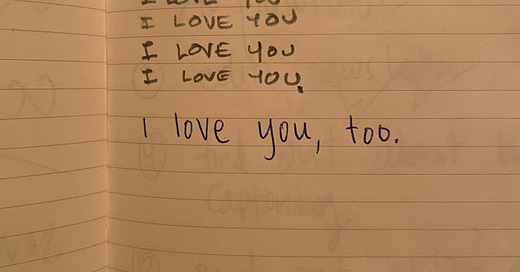You need professional help.
The voice on the phone was my best friend, Julianna. I rubbed my thumbnail with my index finger. The surface was rough; a tiny ravine had opened just above the cuticle.
Not you, too.
It was the last nail standing. The other nine had already fallen out. I understood. My body was like fuck this shit, and taking off for greener pastures. Starting at the tips,
she was sending out pieces in emergency escape pods.
I didn’t want professional help. So what if, when I closed my eyes, I saw silver, vintage robots stomping through a landscape of severed heads? So what if I couldn’t stop involuntarily sticking my tongue out, just as Gabe’s was when I found him. Sometimes, I just pressed it against the inside of my lower lip. That had to be progress.
It had been a few weeks since the sheriffs blazed onto our property, lights on, sirens screaming. The first officer came out with his gun drawn. He asked if Gabe had any weapons.
No, just the suicide.
He left the shed quickly and declared he had passed. Exceptional police work. My father, who stayed with me, was cordial and talkative to the officer and the subsequent officers who arrived. I was sobbing on a retaining wall. An officer with long baby-doe eyelashes approached me; she asked if she could hug me. I agreed, and she held me hard against her bulletproof vest.
Is there anyone you want me to call?
I gave her my phone, and she went through it to call my best friends. Then we loitered, me sobbing into my father’s broad shoulders, leaving his shirt soaked, officers meandering around my 3-acre property. A trauma volunteer wearing a lanyard and laminated pass gives her permission to be present on the scene.
You’re in shock.
I wanted nothing more than to find the words to ask her to leave, but luckily, my friends started to arrive and encircled me, shielding me from the prying eyes of the volunteer. We were waiting for the medical examiner. A rotund man with an assistant pulled onto the property. No one would let me go back into the shed.
You don’t want to see that.
That seemed like an odd response; I had, in fact, seen that. It was overlaid onto my pupils and all I would ever see for months to come.
They wheeled Gabe out on a stretcher inside a black bag. They really use those. The medical examiner gave me my first condolences and said I could say goodbye and pointed to the spot where his head was. A helpful orientation. I stood there, placing my hands on the bag. I could feel the marble through the material, cold and hard and unforgiving. Where once there was life, now there was stone.
I agreed to consider professional help.
Now there were tiny boxes of people on my laptop screen. I zoomed into the acute grief support group from my bed. These box people were all spouses or partners of a person who had died. Some of them had a long death from cancer, some had a sudden cardiac arrest, a drug overdose or two. None like me, but all trying to grab onto something in the freefall.
There were the box sharers that talked in every group. The ones that took about 30 minutes to warm up and gave the first-line sharers a break. There was me who would burst in with an irreverent detail about something that never really made sense. But there was one box who never spoke. She was a beautiful blonde woman, probably my age. She said her partner had a sudden massive heart attack, and that is all we, the other boxes, knew.
She sat very still, looking directly into the camera of her device. I was fascinated by her. I wondered why she never spoke but always came to the group. Perhaps her partner was married, and she was the other woman, feeling ashamed of her situation. I considered these and many different options for the blonde woman box as others would share their sadness, anger, and grief.
After a few weeks, I stopped attending. Right when it felt like the group was transitioning from acute loss to taking on a new identity: a widow or widower.
I wouldn’t wear grief like that. I had other things going on, like a new obsession with learning how to pierce the veil and communicate with the dead. It took up a substantial amount of my time.
Not to mention that I had two children to care for; three and eight years old. I fought brutally through the mud of grief to make breakfasts and lunches, brush teeth, and send them off to school. Harder yet was the evening routine. After a day of merely existing, I was Artax sinking into the Swamp of Sadness. The bright blue eyes of my children called out to me as Atreyu, but in this story, I never completely submerged. I forced smiles and comfort and drew warm bubble baths. I snuggled little bodies to sleep. I answered challenging questions about Dad.
I think Dad is just at Target.
My sweet young boy with cherubic curls had several scenarios where he thought his Dad might be. He may still be at work. He may have stopped at the store.
No, Dad died. Remember? That’s when your body and brain don’t work anymore.
Are you sure the doctors can’t save him?
My daughter, with tears welling up, wanted more details.
Yes, I am sure.
How do you know, Mom? Can we call them tomorrow? Maybe they can still save him.
They cannot.
Eventually, after the questions and my answers, which didn’t satisfy them but at least ran out the clock, they would sleep.
Then I went back to bed to weep freely, alone.




